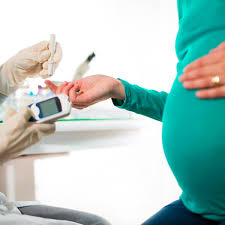
Motherhood is a phenomenal experience and it is a time when the body undergoes a lot of changes both physically and hormonally. A major metabolic change that moms-to-be experience during this phase will be issues while breaking sugars down and this is termed as Gestational Diabetes. Being diagnosed with Gestational Diabetes does not mean that you cannot have a healthy pregnancy. This condition can be managed with proper and balanced diet, exercise and regular monitoring without the need to take medications and without posing any health risk for the mother or baby.
The exact cause of Gestational Diabetes is unknown, but hormones do play a role. During pregnancy the body produces larger amounts of some hormones like human placental lactogen (hPL) or hormones that increase resistance. These hormones affect the placenta and help sustain the pregnancy. As time progresses the amount of these hormones in the body increases. This will then consequently make the body resistant to insulin which is the hormone that is responsible for regulating blood sugar.
Gestational Diabetes usually develops between the 24th and 28th weeks of pregnancy. The tricky thing is that there may not be any noticeable symptoms for Gestational Diabetes. Most of the signs are similar to common pregnancy related symptoms and hence is confusing but a blood test can confirm the diagnosis. But if the lady is obese, has a family history of Type 2 Diabetes or if she has had Pregestational Diabetes before becoming pregnant then the chances are quite high. Some of the mild symptoms of the condition could be fatigue, blurred vision, excessive thirst, excessive need to urinate, snoring. Pregestational Diabetes has nine classes that depend on the age of the woman at diagnosis and certain complications of the disease. The particular class of diabetes that the patient has can tell the doctor about the severity of the condition. When a Prediabetic condition already exists then the pregnancy will require extra monitoring.
Women with Gestational Diabetes often require extra care and follow-up because uncontrolled high maternal blood sugar poses a health risk for mother and child. Many babies whose mothers had gestational diabetes may not have related health problems. But if the sugar levels are not managed properly the baby is still at an increased risk of excessive birth weight, early (preterm) birth, serious breathing difficulties, low blood sugar or Hypoglycemia, stillbirth and Macrosomia. There is also a 2 to 4 percent chance of the baby developing type 2 Diabetes or being obese later in life.
The diet of a woman with Gestational Diabetes should ideally include protein along with the right mix of carbohydrates and fats. Too many carbohydrates can lead to spikes in the blood sugar. Hence whatever carbs is chosen should be the good and complex kind like legumes, whole grains, and starchy veggies like sweet potatoes. The carb needs and tolerance is specific to individuals and depends on factors such as medication use, body weight, and blood sugar control. Eat protein with every meal, include daily fruits and vegetables in your diet, limit or avoid processed foods and most importantly pay attention to portion sizes to avoid overeating. Healthy snacking is great for keeping blood sugar levels stable with Gestational Diabetes.
Work with the doctor or dietician to formulate a diet plan to promote optimal blood sugar control during pregnancy that suits the individual needs. With Gestational Diabetes, the mother’s health, the baby’s health and baby’s weight is what will determine if the delivery will be normal or caesarean. The blood glucose levels will be closely monitored during labor and delivery.
For enquiries related to Gestational Diabetes and other high risk pregnancies, send a message to www.KJKHospital.com/contact





